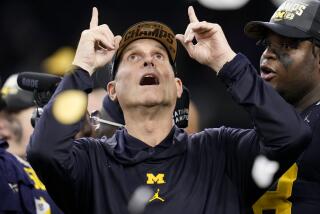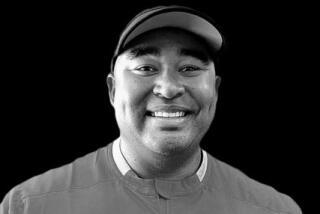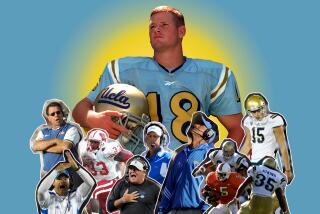Chuck Muncie dies at 60; Saints and Chargers running back
Chuck Muncie, a star running back with the New Orleans Saints and the San Diego Chargers who overcame a cocaine habit that ended his career and then devoted his later life to helping others avoid drug abuse, has died. He was 60.
Muncie died Monday of a heart attack at his Los Angeles-area home, his family announced.
After a stellar career at UC Berkeley, Muncie played in the National Football League from 1976 to 1984 and was selected to play in three Pro Bowls. He spent more than four years with the Saints before joining the Chargers in the middle of the 1980 season.
PHOTOS: Notable deaths of 2013
In a statement, the Chargers called him “one of the greatest running backs” in the team’s history and a “tremendous athlete with a larger-than-life personality.”
Recruited to play football at Cal, Muncie started using cocaine and his drug-abuse only increased once he made it to the NFL, he said in interviews.
After the first regular-season game of 1984, Muncie’s career came to a dramatic end when then-NFL Commissioner Pete Rozelle suspended him after Muncie tested positive for cocaine.
Five years later Muncie was arrested and sentenced to 18 months for selling cocaine. Going to jail saved his life, he often said, and while behind bars he vowed to turn his life around.
In 1997 he established the Chuck Muncie Youth Foundation, a California-based nonprofit that helped youngsters steer clear of drugs and the kinds of bad decisions that nearly destroyed him. It also offered a highly regarded tattoo-removal program.
He also spearheaded a mentoring program for athletes at UC Berkeley that “would have made all the difference” when he was at the school, Muncie told The Times in 2008.
“Back in the ‘70s, everything was about experimentation,” he said in the article. “It was a different time and we didn’t have the education we now have on drug abuse.”
But he was still able to lead the Golden Bears to a share of the then-Pacific 8 Conference championship in 1975.
In a statement, his former wife, Robyn Hood, said that Muncie’s “most impressive work was done in the second chapter of his life” and that he “simply wanted others to learn from his mistakes. He made a difference.”
He was born Harry Vance Muncie on March 17, 1953, in Uniontown, Penn., an industrial city south of Pittsburgh. One of six children, he played football in high school and saw sports as his only way to escape small-town life, he told a UC Berkeley magazine in 1999.
At 6 feet 3 and 225 pounds, Muncie was gifted with size, speed and power. While playing for Cal, he finished second to Archie Griffin of Ohio State in the Heisman Trophy voting in 1975. He also earned a bachelor’s degree in social studies, according to the magazine.
A first-round draft pick by the Saints in 1976, Muncie was paired with Tony Galbreath in the team’s backfield. They were dubbed “Thunder and Lightning.”
In 1979, Muncie became the first Saints running back to break the 1,000-yard barrier in a season, with 238 carries for 1,198 yards and 11 touchdowns.
Former teammate Don Reese told Sports Illustrated in 1982 that Muncie had to be a “superman” to continue performing at such a high level despite his addiction.
Muncie would finish his NFL career with 1,561 carries for 6,702 yards, a 4.3-yard average, and 71 touchdowns. He also had 263 receptions for 2,323 yards.
In the middle of the 1980 season, Muncie was traded to the Chargers and the next year he led the NFL in rushing touchdowns with 19.
PHOTOS: Notable deaths of 2013
That same year, his Chargers teammate Dan Fouts, the Hall of Fame quarterback, led the league in passing yardage. Together they anchored what was known as the “Air Coryell” offense named after their coach, Don Coryell.
“He was a special player, and a unique person,” Fouts said Tuesday. “As a teammate, he was extraordinary.... People just loved Chuck Muncie. Even for his faults, he never appeared to be a bad guy.”
Muncie is survived by his daughter, Danielle Ward, three grandchildren and two sisters.
Times staff writer Sam Farmer contributed to this report.
More to Read
Start your day right
Sign up for Essential California for the L.A. Times biggest news, features and recommendations in your inbox six days a week.
You may occasionally receive promotional content from the Los Angeles Times.






